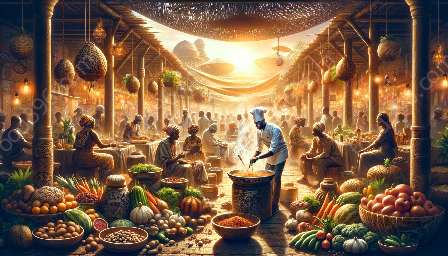Discover the cultural significance and rich heritage of African food rituals and festivals, rooted in the history of African cuisine.
The Historical Significance of African Cuisine
African cuisine has a deep and complex history, influenced by a variety of factors including geography, climate, and cultural practices. The continent's diverse landscape and climates have given rise to a wide range of ingredients and cooking techniques that have been passed down through generations, forming the foundation of traditional African cuisine.
The Role of African Food Rituals
Food holds a special place in African culture, and food rituals play a fundamental role in various aspects of African life. These rituals are deeply intertwined with spiritual beliefs, social gatherings, and important life events, embodying the rich cultural heritage of the continent.
Cultural Significance
African food rituals are deeply symbolic, reflecting cultural beliefs, values, and traditions. Through these rituals, communities express communal pride and unity, reinforcing social bonds and shared identity. In many African societies, food rituals are central to marking significant life events such as birth, adolescence, marriage, and death.
Spiritual Connections
Many African food rituals are closely linked to spiritual practices and ancestral worship. In various African cultures, specific foods are offered as sacrifices or used in ceremonial feasts to honor ancestors or seek blessings from deities. These rituals serve as a way to maintain a connection with the spiritual world and express gratitude for the gifts of nature.
Symbolism and Tradition
The preparation and consumption of food in African cultural rituals are often steeped in symbolism and tradition. Specific ingredients, cooking methods, and serving practices carry deep cultural significance, serving as a means of preserving tradition and passing down ancestral knowledge from one generation to the next.
Key African Food Rituals and Festivals
Wine and Harvest Festivals
Harvest festivals are celebrated in various African cultures to mark the end of the growing season and give thanks for a successful harvest. These festivals often involve vibrant ceremonies, traditional dances, and feasting on freshly harvested food. Wine festivals also hold a special place, celebrating the production and consumption of locally made wines as a symbol of fertility and abundance.
Ceremonial Feasts
Communal feasting plays a central role in African food rituals, bringing communities together to share food, stories, and traditions. Ceremonial feasts are often held to mark important occasions such as weddings, initiations, and religious celebrations, showcasing the culinary heritage of each community and reinforcing social cohesion.
New Year Celebrations
New Year festivities in Africa are characterized by an abundance of traditional dishes and rituals that vary across different regions and communities. These celebrations often include special meals, traditional dress, and symbolic activities to welcome the new year with joy and optimism.
Ancestral Remembrance Ceremonies
Across Africa, the remembrance of ancestors is an integral part of cultural identity, and food rituals play a significant role in these ceremonies. Families gather to honor their ancestors through traditional meals, offerings, and rituals that reflect a deep sense of respect and reverence for the past.
African Cuisine History and Influences
African cuisine history is shaped by a rich tapestry of influences, including indigenous crops, trade routes, colonialism, and global migration. The continent's culinary traditions have been shaped by the introduction of new ingredients, cooking techniques, and cultural exchanges that have diversified and enriched African cuisine over time.
Indigenous Ingredients
African cuisine is characterized by the abundant use of indigenous ingredients such as yams, cassava, millet, sorghum, and a variety of leafy greens. These staples form the foundation of many traditional African dishes, offering a rich source of nutrients and flavors that have sustained communities for centuries.
Influences of Trade and Migration
The historical trade routes of Africa have played a pivotal role in shaping the continent's culinary landscape. The exchange of goods, including spices, grains, and livestock, through trade routes like the Trans-Saharan and Indian Ocean trade networks, resulted in the fusion of flavors and culinary techniques from different regions and cultures.
Colonial Legacy
The colonial period brought significant changes to African cuisine, as European colonial powers introduced new crops, cooking methods, and dietary practices to the continent. This period of cultural exchange led to the integration of new ingredients such as tomatoes, chili peppers, and vegetables, which became essential elements of African cuisine.
Global Influence and Culinary Innovation
Global migration and the interconnectedness of modern society have contributed to the evolution of African cuisine. The adoption of international cooking styles, fusion cuisine, and culinary innovation has brought new dimensions to traditional African dishes, resulting in a dynamic and diverse culinary landscape that reflects the continent's rich history and global connections.

